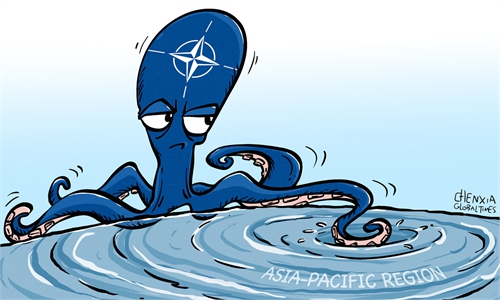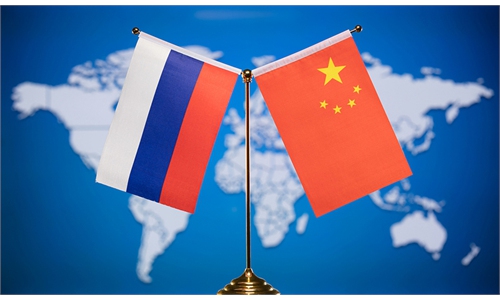
Illustration: Chen Xia/GT
US Secretary of State Antony Blinken will embark on a 10-day trip to Asia on Wednesday. This will be Blinken's 18th visit to the so-called Indo-Pacific region since taking the post. Many US media have pointed out that Blinken's attempt to bolster relations with Asian countries this time is aimed at China.
This is a large-scale trip by the US to shore up the "Indo-Pacific Strategy," during which Secretary of Defense Lloyd J. Austin III will meet with his Japanese and South Korean counterparts, and Austin and Blinken will attend the fourth US-Philippines 2+2 Ministerial Dialogue. The intention to "encircle" China can't be more obvious.
When Blinken talked about China-US relations at the Brookings Institution on July 1, he reiterated "competition, contestation and cooperation" and said that China hopes to become a "leading country" in the international system. He said that China's vision for the future is different from that of the US, hence, the US is going to make sure that it is the one who is effectively shaping the future. Blinken staged a typical show of Western politicians using "noble words" to spread strategic malice.
The US is currently grappling with the presidential election, and other countries are now confused about the US policies which have become uncertain. Therefore, the US hastily sent Blinken to appease its allies and give an explanation to these countries. But for Blinken's trip, its symbolic significance far outweighs its practical significance.
"Blinken's Asia trip is not expected to achieve any substantive result. The US has engaged with these Asian countries all these years, but the outcomes have been minimal. Of course, the US will not give up. It will maintain routine contact and hope that some of its needs can be met at some point in the future. At present, I think it is difficult for Washington to leverage anything in these countries." Lü Xiang, a research fellow at the Chinese Academy of Social Sciences, told the Global Times.
From China's perspective, it should be highly vigilant about whether Biden's administration will use the remaining time to try to provoke more disputes in this region, particularly conflicts between the Philippines and China, and take it as the political legacy of this incumbent administration.
The US has significantly strengthened its relations with several Asian countries in recent years, especially countries that are involved in territorial disputes with Beijing in the South China Sea. Just two days after China and the Philippines announced on Sunday that the two sides reached an understanding on managing the situation at China's Ren'ai Jiao (also known as Ren'ai Reef), Blinken announced his Asia trip. He will likely further promote camp confrontation during this trip.
The US certainly doesn't want to see peace between Beijing and Manila, that's why it is now emphasizing the dispute and its determination to defend the Philippines. White House National Security Advisor Jake Sullivan even stated on July 19 that the US will "take all necessary measures" to ensure that the Philippines can send supplies to the illegally grounded warship at Ren'ai Jiao. These US politicians don't care about the consequences at all, because the US will not really participate in conflicts, but simply transfer risks to its proxies.
In addition, the US is in chaos domestically, and therefore Blinken's Asia trip further demonstrates that the US not only fails to handle its internal affairs, it also wants to aggravate the chaotic situation across the world.
The US has evil intentions to bolster relations with Asian countries during his trip, that is, to destroy the original development and cooperation atmosphere in this region in an attempt to make geopolitics become the focus. The US wants to build Southeast Asia into a strategic barrier to contain China. It shouts noble slogans of "democracy," "rules-based orders" and "freedom" here, but what it actually does is expand the rifts and suspicions in the region and catalyze the fermentation of every dispute. What it most wants to see is chaos in the region, which will lead to its deep involvement and the reliance of countries in the region on the US.
China always views Southeast Asia from the perspective of development and good neighborliness, while the US views this region from the perspective of major power competition. Countries in the region should keep their eyes open, make clear what the US is seeking here, what consequences it may have, and take precautions against it, so as to prevent US destructive strategies from undermining peace in the region.
The author is a reporter with the Global Times. opinion@globaltimes.com.cn


